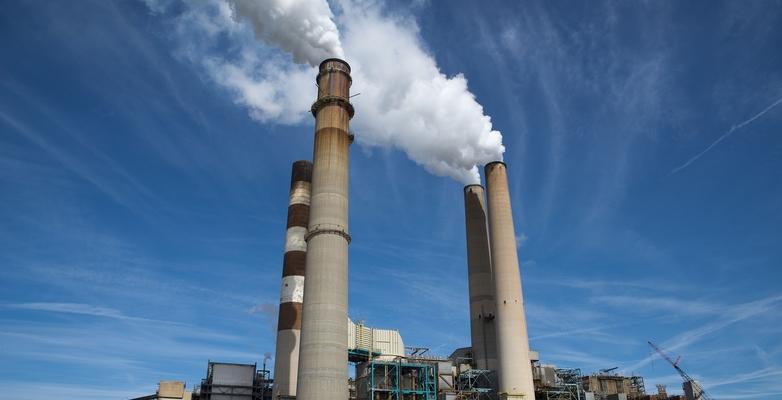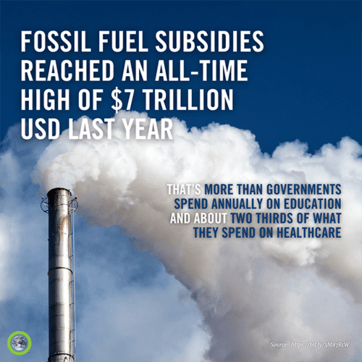
Fossil Fuel Subsidies in Public Finance
The more fossil fuels are subsidized, the more infrastructure will be developed, and the more difficult it will be to transition to clean energy sources that are already available to us.
3 min readLike it or not, we're all paying the fossil fuel industry to destroy the planet every time we do our taxes.
That’s right. Each of us is chipping in our hard-earned dollars, all to an industry earning billions in profits every year. One whose product is heating up our planet and sowing more and more climatic chaos the higher the thermometer rises.
We’re doing it through fossil fuel subsidies. And the time to end them is now.
Oil Change International defines fossil fuel subsidies as “any government action that lowers the cost of fossil fuel energy production, raises the price received by energy producers, or lowers the price paid by energy consumers.” In other words, subsidies are specifically designed to artificially make coal, oil, and natural gas more competitive and economical than other energy sources.
Subsidies largely come in the form of tax giveaways and direct funding. But they can also include more indirect forms of finance, from loans with lower-than-market interest rates and price controls to research & development funding and heavily discounted land for project development.
According to the International Monetary Fund (IMF), fossil fuel subsidies reached an all-time high of $7 trillion USD last year, costing the equivalent of over 7% of global GDP. To put it in more relatable terms, it’s “more than governments spend annually on education and about two thirds of what they spend on healthcare.” Fossil fuel subsidies rose by $2 trillion USD over the past two years alone.

In general, most fossil fuel subsidies are implicit. This means that they fail to consider the negative externalities of fossil fuel production, such as the environmental and human health consequences of GHG emissions and particulate matter pollution. While it may seem difficult to account for these costs, the IMF estimates that implicit government subsidies resulted in failing to cover over $5 trillion worth of environmental damages last year.
We’ve seen the public health effects, environmental destruction, and climate impacts and costs of burning fossil fuels. Yet, fossil fuel subsidies are actively rewarding Big Oil – which enjoyed record-breaking profits in 2022 – for the massive damage they’re doing. Even worse, they’re shifting the many costs associated with production from polluters to consumers – especially those living immediately adjacent to such highly polluting facilities.
Subsidies also contribute to “carbon lock-in.” The more fossil fuels are subsidized, the more infrastructure will be developed, and the more difficult it will be to transition to clean energy sources that are already available to us. Fossil fuel infrastructure developed today will be around for decades to come, further contributing to global carbon emissions.
By one estimate, removing both explicit and implicit fossil-fuel subsidies could “prevent 1.6 million premature deaths annually and raise government revenues by $4.4 trillion” while drastically reducing emissions and putting us back on track to keeping global warming limited to 1.5 degrees C. But as we push for governments and multilateral development banks to phase out their fossil fuel subsidies, we must ensure the money is redirected for better use. Fossil fuel subsidies have taken money away from important social services like health care and education, not to mention access to clean, affordable, and reliable energy so needed in order to make a just transition.
If you’re looking for an action you can take right now, join us in calling on G20 leaders to end giveaways to fossil fuel companies that are already making billions in profit driving climate devastation.




